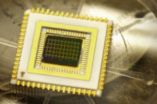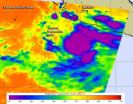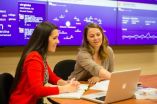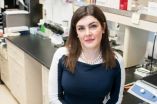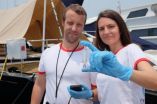UT Arlington research uses nanotechnology to help cool electrons with no external sources
Electronic devices could use power more efficiently
2014-09-10
(Press-News.org) A team of researchers has discovered a way to cool electrons to −228 °C without external means and at room temperature, an advancement that could enable electronic devices to function with very little energy.
The process involves passing electrons through a quantum well to cool them and keep them from heating.
The team details its research in "Energy-filtered cold electron transport at room temperature," which is published in Nature Communications on Wednesday, Sept. 10.
"We are the first to effectively cool electrons at room temperature. Researchers have done electron cooling before, but only when the entire device is immersed into an extremely cold cooling bath," said Seong Jin Koh, an associate professor at UT Arlington in the Materials Science & Engineering Department, who has led the research. "Obtaining cold electrons at room temperature has enormous technical benefits. For example, the requirement of using liquid helium or liquid nitrogen for cooling electrons in various electron systems can be lifted."
Electrons are thermally excited even at room temperature, which is a natural phenomenon. If that electron excitation could be suppressed, then the temperature of those electrons could be effectively lowered without external cooling, Koh said.
The team used a nanoscale structure – which consists of a sequential array of a source electrode, a quantum well, a tunneling barrier, a quantum dot, another tunneling barrier, and a drain electrode – to suppress electron excitation and to make electrons cold.
Cold electrons promise a new type of transistor that can operate at extremely low-energy consumption. "Implementing our findings to fabricating energy-efficient transistors is currently under way," Koh added.
Khosrow Behbehani, dean of the UT Arlington College of Engineering, said this research is representative of the University's role in fostering innovations that benefit the society, such as creating energy-efficient green technologies for current and future generations.
"Dr. Koh and his research team are developing real-world solutions to a critical global challenge of utilizing the energy efficiently and developing energy-efficient electronic technology that will benefit us all every day," Behbehani said. "We applaud Dr. Koh for the results of this research and look forward to future innovations he will lead."
Usha Varshney, program director in the National Science Foundation's Directorate for Engineering, which funded the research, said the research findings could be vast.
"When implemented in transistors, these research findings could potentially reduce energy consumption of electronic devices by more than 10 times compared to the present technology," Varshney said. "Personal electronic devices such as smart phones, iPads, etc., can last much longer before recharging."
In addition to potential commercial applications, there are many military uses for the technology. Batteries weigh a lot, and less power consumption means reducing the battery weight of electronic equipment that soldiers are carrying, which will enhance their combat capability. Other potential military applications include electronics for remote sensors, unmanned aerial vehicles and high-capacity computing in remote operations.
Future research could include identifying key elements that will allow electrons to be cooled even further. The most important challenge of this future research is to keep the electron from gaining energy as it travels across device components. This would require research into how energy-gaining pathways could be effectively blocked.
INFORMATION:
Co-authors of the paper are Pradeep Bhadrachalam, Ramkumar Subramanian, Vishva Ray and Liang-Chieh Ma from UT Arlington, and Weichao Wang, Prof. Jiyoung Kim and Prof. Kyeongjae Cho from UT Dallas who also were part of the research team.
Funding from the National Science Foundation (grant numbers 0449958 and 0925997) and the Office of Naval Research (grant number N00014-12-1-0492) supported the research.
About UT Arlington
The University of Texas at Arlington is a comprehensive research institution and the second largest institution in The University of Texas System. The Chronicle of Higher Education ranked UT Arlington as the seventh fastest-growing public research university in 2013. U.S. News & World Report ranks UT Arlington fifth in the nation for undergraduate diversity. Visit http://www.uta.edu to learn more. Follow #UTAdna on Twitter. END
ELSE PRESS RELEASES FROM THIS DATE:
NASA catches birth of Tropical Storm Odile
2014-09-10
The Eastern Pacific Ocean continues to turn out tropical cyclones and NASA's Aqua satellite caught the birth of the fifteenth tropical depression on September 10 and shortly afterward, it strengthened into a tropical storm and was renamed Odile.
The Atmospheric Infrared Sounder or AIRS instrument that flies aboard NASA's Aqua satellite captured infrared data on Tropical Depression 15-E on September 10 at 8:53 UTC (4:53 a.m. EDT) when it developed. The National Hurricane Center named the depression at 5 a.m. EDT, when the center was located near latitude 14.4 north and ...
A new way to look at diabetes and heart risk
2014-09-10
People with diabetes who appear otherwise healthy may have a six-fold higher risk of developing heart failure regardless of their cholesterol levels, new Johns Hopkins Bloomberg School of Public Health research suggests.
In nearly 50 percent of people with diabetes in their study, researchers employing an ultra-sensitive test were able to identify minute levels of a protein released into the blood when heart cells die. The finding suggests that people with diabetes may be suffering undetectable – but potentially dangerous – heart muscle damage possibly caused by their ...
Study: Sports broadcasting gender roles echoed on Twitter
2014-09-10
Twitter provides an avenue for female sports broadcasters to break down gender barriers, yet it currently serves to express their subordinate sports media roles.
This is the key finding of a new study by Clemson University researchers and published in the most recent issue of Journal of Sports Media.
"Social media has been embraced by the sports world at an extraordinary pace and has become a viable avenue for sports broadcasters to redefine their roles as celebrities," said Melinda Weathers, lead author on the study and assistant professor of communication studies ...
Cyberbullying increases as students age
2014-09-10
RIVERSIDE, Calif. — As students' age they are verbally and physically bullied less but cyberbullied more, non-native English speakers are not bullied more often than native English speakers and bullying increases as students' transition from elementary to middle school.
Those are among the findings of a wide-ranging paper, "Examination of the Change in Latent Statuses in Bullying Behaviors Across Time," recently published in the journal School Psychology Quarterly.
Authors of the paper are: Cixin Wang, an assistant professor at the University of California, Riverside's ...
Even small stressors may be harmful to men's health, new OSU research shows
2014-09-10
CORVALLIS, Ore. – Older men who lead high-stress lives, either from chronic everyday hassles or because of a series of significant life events, are likely to die earlier than the average for their peers, new research from Oregon State University shows.
"We're looking at long-term patterns of stress – if your stress level is chronically high, it could impact your mortality, or if you have a series of stressful life events, that could affect your mortality," said Carolyn Aldwin, director of the Center for Healthy Aging Research in the College of Public Health and Human ...
Unnecessary antibiotic use responsible for $163 million in potentially avoidable hospital costs
2014-09-10
Arlington, Va. (September 10, 2014) – The Centers for Disease Control and Prevention (CDC) and Premier, Inc. have released new research on the widespread use of unnecessary and duplicative antibiotics in U.S. hospitals, which could have led to an estimated $163 million in excess costs. The inappropriate use of antibiotics can increase risk to patient safety, reduce the efficacy of these drugs and drive up avoidable healthcare costs. The study is published in the October issue of Infection Control and Hospital Epidemiology, the journal of the Society for Healthcare Epidemiology ...
Blocking one receptor could halt rheumatoid arthritis
2014-09-10
Researchers at the University of Illinois at Chicago College of Medicine have shown for the first time how the activation of a receptor provokes the inflammation and bone degradation of rheumatoid arthritis -- and that activation of this one receptor, found on cells in the fluid of arthritic joints, is all that is required.
Their findings, published online in the Journal of Immunology, point to a new therapeutic target to interrupt the vicious cycle of inflammation and bone erosion in rheumatoid arthritis.
Rheumatoid arthritis is a progressive autoimmune inflammatory ...
NTU partners international universities to build a network of citizen oceanographers
2014-09-10
Nanyang Technological University (NTU) is working with other international universities to build a global network of 'citizen scientists' on a free-to-access database for oceanographic data.
While much attention is placed on mammals and fish in the sea, it is the tiny, marine microbes that supports the nutrient cycle and forms the foundation of the food web. Known as the marine microbiome, they are the most abundant organisms in the ocean but also the least understood.
To gain a better understanding of such marine life and its environment, NTU scientists at the Singapore ...
Residual hydraulic fracturing water not a risk to groundwater
2014-09-10
Hydraulic fracturing -- fracking or hydrofracturing -- raises many concerns about potential environmental impacts, especially water contamination. Currently, data show that the majority of water injected into wells stays underground, triggering fears that it might find its way into groundwater. New research by a team of scientists should help allay those fears.
In a paper published in the current issue of the Journal of Unconventional Oil and Gas Resources, Terry Engelder, professor of geosciences, Penn State; Lawrence Cathles, professor of earth and atmospheric sciences, ...
Penn research shows how brain can tell magnitude of errors
2014-09-10
University of Pennsylvania researchers have made another advance in understanding how the brain detects errors caused by unexpected sensory events. This type of error detection is what allows the brain to learn from its mistakes, which is critical for improving fine motor control.
Their previous work explained how the brain can distinguish true error signals from noise; their new findings show how it can tell the difference between errors of different magnitudes. Fine-tuning a tennis serve, for example, requires that the brain distinguish whether it needs to make a ...
LAST 30 PRESS RELEASES:
Fossil amber reveals the secret lives of Cretaceous ants
Predicting extreme rainfall through novel spatial modeling
The Lancet: First-ever in-utero stem cell therapy for fetal spina bifida repair is safe, study finds
Nanoplastics can interact with Salmonella to affect food safety, study shows
Eric Moore, M.D., elected to Mayo Clinic Board of Trustees
NYU named “research powerhouse” in new analysis
New polymer materials may offer breakthrough solution for hard-to-remove PFAS in water
Biochar can either curb or boost greenhouse gas emissions depending on soil conditions, new study finds
Nanobiochar emerges as a next generation solution for cleaner water, healthier soils, and resilient ecosystems
Study finds more parents saying ‘No’ to vitamin K, putting babies’ brains at risk
Scientists develop new gut health measure that tracks disease
Rice gene discovery could cut fertiliser use while protecting yields
Jumping ‘DNA parasites’ linked to early stages of tumour formation
Ultra-sensitive CAR T cells provide potential strategy to treat solid tumors
Early Neanderthal-Human interbreeding was strongly sex biased
North American bird declines are widespread and accelerating in agricultural hotspots
Researchers recommend strategies for improved genetic privacy legislation
How birds achieve sweet success
More sensitive cell therapy may be a HIT against solid cancers
Scientists map how aging reshapes cells across the entire mammalian body
Hotspots of accelerated bird decline linked to agricultural activity
How ancient attraction shaped the human genome
NJIT faculty named Senior Members of the National Academy of Inventors
App aids substance use recovery in vulnerable populations
College students nationwide received lifesaving education on sudden cardiac death
Oak Ridge National Laboratory launches the Next-Generation Data Centers Institute
Improved short-term sea level change predictions with better AI training
UAlbany researchers develop new laser technique to test mRNA-based therapeutics
New water-treatment system removes nitrogen, phosphorus from farm tile drainage
Major Canadian study finds strong link between cannabis, anxiety and depression
[Press-News.org] UT Arlington research uses nanotechnology to help cool electrons with no external sourcesElectronic devices could use power more efficiently
